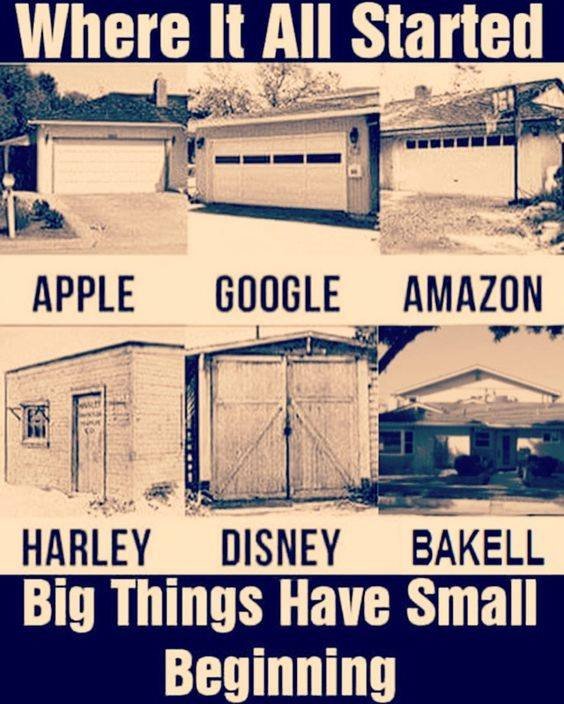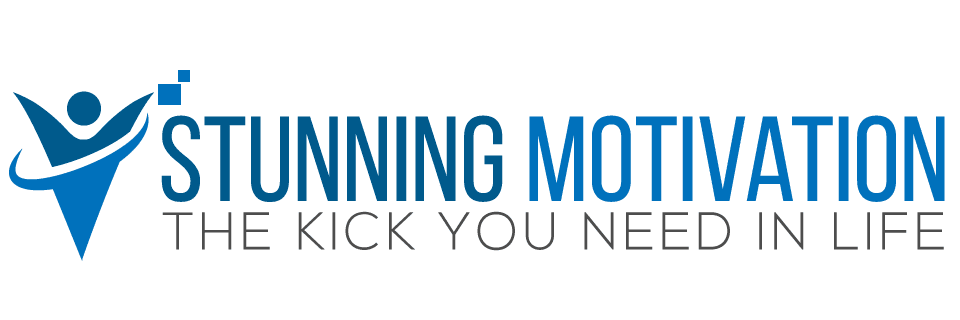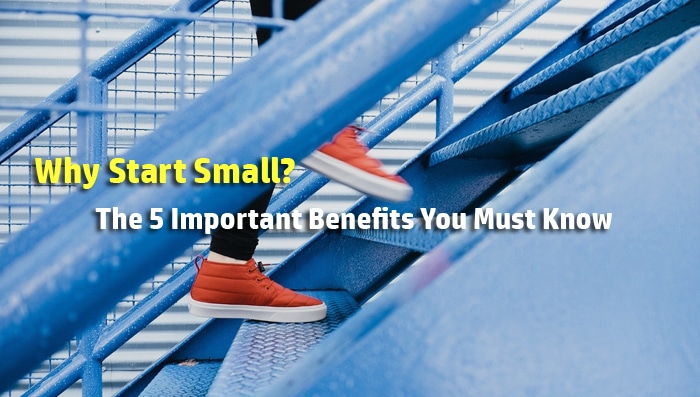Why start small when you can go big? One of the most controversial perceptions about achieving what we want in life is to think big and to live big. While there is nothing wrong with thinking big, when it comes taking action and making progress, starting small is the key.
Most people have the idea of doing big and bold. They read books and they were told to do big things, to be bold, and to make take the leap of faith.
You either go big, or you go home. Sounds familiar?
However, in my opinion, if you want to build a habit or do something for the long term, you need the opposite approach, which is starting small.
How Starting Small Gives Rise to a Best-Selling Book
According to this article from BufferApp.com, Dale Carnegie, the famous and best-selling author of How to Win Friends and Influence People, got the idea of the book from starting small. This was what Carnegie said:
“I prepared a short talk. I called it ‘How to Win Friends and Influence People.’ I say ‘short.’ It was short in the beginning, but it soon expanded to a lecture that consumed one hour and thirty minutes.”
After Carnegie shared his talks for some time, he found that some of the attendees were interested to learn more and they discussed some of the “principles” that emerged from the talks.
Eventually, the short talk became a course, and then Carnegie started to develop the book because there was a need for a textbook for his course:
“We started with a set of rules printed on a card no larger than a postcard. The next season we printed a larger card, then a leaflet, then a series of booklets, each one expanding in size and scope. After fifteen years of experimentation and research came this book.”
Such is the power of starting small.
In fact, if you look at most of the successful businesses out there, like Apple, Dell, Amazon, etc., they all started small.
Take a good look at this picture below:

All the great successes started small. This reminds me of this quote below:
“Every master was once a beginner.”
So why start small? If you are still not convinced, here are the 5 benefits of starting small.
1. Starting small requires less time and energy
This is common sense. It is easier to take a small action than it is to take a big one.
Let me give you an example. If you want to lose weight, do you start with hitting the gym 3 hours a day for 7 days a week or do you start with just an hour a day for 3 days a week?
The first option sounds more powerful, but is it sustainable? Highly likely not.
This is because when you start big, it takes a lot of your energy and time. And when the resistance is high, your chances of giving up on it will be high too.
Thus, if you want to make your habit stick, make sure you start small. The key is to make the action easy to carry out so that the resistance will be lowered.
When something is easy to do, like brushing your teeth, you will never question yourself if you should do it. You just do.
2. Starting small prevents overwhelming and paralysis
As I mentioned above, when the resistance is small, it is easier to carry out the task. And this actually prevents you from feeling overwhelming and paralysis.
Imagine you want to write a 300 pages book. You’re so pumped up with the idea because you believe your book can sell thousands of copies. So, you set a target to finish the book in a week. Do you think this is achievable?
Well, there is a possibility, right? But, is the probability high? It just makes you feel overwhelmed.
This is why a lot of people fail to reach their goals because they set a goal that is so big that they set themselves up to fail.
Here’s another common example. We all love the idea of earning an income from the comfort of our home. And so, we try to start an internet business with the hope that we can make a million dollars in a year.
But, many people fail to consider their own capabilities. They want to be a millionaire and they want it now. They fail to realize that it is a big task that requires a lot of planning and consistent hard work.
And once they started their journey, only then they discover that it is not easy to become a millionaire. They feel overwhelmed and eventually, give up on the goal.
When you don’t believe that your goal is achievable and within your reach, you will never put in your maximum potential to reach it.
Here’s a great saying from Bill Gates:
“Most people overestimate what they can do in one year and underestimate what they can do in ten years.”
This is a perfect illustration of the power of starting small. People want the big achievement and they want it fast. And they ended up overestimating their ability.
But when it comes to the long-term, they underestimate the power of starting small and how much they can achieve.
3. Starting small grows your confidence and builds your momentum
Besides unclogging your brain to overcome paralysis, starting small also builds your momentum and confidence.
Read my previous post:
Success Cycle: How to Leverage Small Success to Build Bigger Ones
Tony Robbins, one of my favorite success gurus once said:
“People who succeed have momentum. The more they succeed, the more they want to succeed, and the more they find a way to succeed. Similarly, when someone is failing, the tendency is to get on a downward spiral that can even become a self-fulling prophecy.”
Can you see it clearly now? The more you succeed, the more you want to succeed.
When you create small victories, you feel good. And when you feel good, you will want to do more and take more action. When you take more action, you get even more results.
Success is a cycle.
This is why starting small is important because it creates victories that will drive you to move forward to create even more victories.
4. Starting small lower your stakes and gives you immediate feedback
Eric Ries, the author of Lean Startup nails it. He shared the idea of a “Minimum Viable Product” or MVP where you come up with a product with just enough features to satisfy early customers and to provide feedback for future product development.
When you start a business or a project, you do not know if your business idea will work out.
Hence, you start with an MVP. You develop the product at a lower cost and you test the product to the market quickly. You want to know if the fundamental idea will work.
If the product fails, at least you did not spend millions or billions on it.
An MVP can quickly give you insight if something is working out or not.
When you start a project, like an online business. You don’t want to spend months and even years into doing the research only to discover that the ideas don’t work at launching.
One of the best books on productivity that I strongly recommend, What The Most Successful People Do Before Breakfast, written by Laura Vanderkam, started NOT as a book but an article.
The article received so many great feedbacks and views that Vanderkam was offered to turn the article into a book.
The same story happened to another author named Amy Morin. She published an article, 13 Things Mentally Strong People Don’t Do, and the article was read by over 30 million people.
The article catapult Morin to become a best-selling author. The article was the MVP.
So what’s your MVP? You need to start small to find out.
5. Starting small is the first step
Let’s talk about the trillion dollars company, Amazon. We all know that Amazon started off as an online bookstore.
Today, Amazon sells everything from socks to coffee machines. Amazon is the “everything store”.
According to Brad Stone’s book, The Everything Store, Jeff Bezos did not design Amazon to be just an online bookstore. It was planned to be an “everything store” from the beginning.
It was just that Bezos knew that he had to start small in order to grow big. Thus, he decided to start selling books online.
My friend, starting small is the first step. Starting small is how you get things done and move forward.
“The journey of a thousand miles begins with one step.”
– Lao Tzu
So start small.
Is Thinking Big Bad?
So, after reading up to this point, you may doubt that if thinking big is bad.
In my opinion, I believe that thinking big is a MUST.
Don’t get me wrong. I believe that we should THINK BIG, but when it comes to execution and starting, we should always START SMALL.
In other words, think big and start small.
One last thing. You don’t need to start everything small. It depends very much on the nature of the project or the task.
For instance, if the project or the task is long-term, it is always better to start small.
Building a habit is a long-term work. And to make your habit sustainable, you need to start small so that you can act on it on a regular basis.
Do you want to make a habit stick? Start small.
On the other hand, when it comes to short-term or a one-time project, you may want to consider starting big.
I once read a book about affiliate marketing and the author said that he wrote that book within 3 days by locking himself in a hotel room.
Therefore, it depends on the nature of the task or the goal to decide whether you should go big or start small.
The principle of starting small is more applicable to tasks and projects that require sustainability, where you need to take long-term action.
Do you also know that starting small is a great way to reduce resistance and it helps in overcoming procrastination?
If you are someone who always procrastinates, I suggest you learn this method that allows you to get rid of procrastination quickly and easily.
Conclusion
I hope this article gives you a clear idea of why you should start small.
In fact, starting small is one of the most powerful hacks successful people used to create extraordinary results in their lives.
How do you eat an elephant? One bite at a time.
How do you create the huge success you want in life? One step at a time.
Thus, start small and take little actions that will lead you to your ultimate destination.
Dripping water hollows out the stone, not through force but through persistence. So don’t underestimate the power of starting small.
Small efforts sustained over time can produce significant results.
If you like what you read, share this article. Cheers



[…] understand that every big success started small. Every master was once a beginner. And every big business started off as an […]
[…] always start small so that it is easier to do and less resistance. When a task is easy to complete, you are more […]
[…] You will feel overwhelmed if you try to tackle everything all at once. This is why you need to start small. […]
[…] Why Start Small? The 5 Important Benefits of Starting Small […]
[…] Read: Why Start Small? The 5 Important Benefits of Starting Small […]
[…] Why Start Small? The 5 Important Benefits of Starting Small […]
[…] Read: Why Start Small? The 5 Important Benefits of Starting Small […]
[…] Why Start Small? The 5 Important Benefits of Starting Small […]
[…] Read: Why Start Small? The 5 Important Benefits of Starting Small […]
[…] Act small and act consistently. Check out this guide: Why Start Small? The 5 Important Benefits of Starting Small […]
[…] Read: Why Start Small? The 5 Important Benefits of Starting Small […]
[…] Read: Why Start Small? The 5 Important Benefits of Starting Small […]
[…] Read: Why Start Small? The 5 Important Benefits of Starting Small […]
[…] منبع […]
[…] grades of ping pong paddle to train. That way you will appreciate a high-quality paddle more. Starting small is always the […]
[…] Why Start Small? The 5 Important Benefits of Starting Small […]
[…] program is consistency. You don’t want to get burned out in a month and stop for a few months. Start small(click to see benefit of starting […]
[…] media and streaming platforms, you can use your evenings to turn your life around. The secret is to make small changes and observe the benefits as time […]
[…] media and streaming platforms, you can use your evenings to turn your life around. The secret is to make small changes and observe the benefits as time […]
[…] Read: Why Start Small? The 5 Important Benefits of Starting Small […]
[…] Start small by setting aside a little bit of money each month and gradually build up your emergency fund. Even if you can only put a few dollars away, it’s worth doing since those little savings add up over time. […]
[…] Start small by setting apart slightly bit of cash every month and step by step construct up your emergency fund. Even should you can solely put just a few {dollars} away, it’s value doing since these little financial savings add up over time. […]